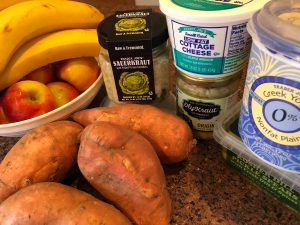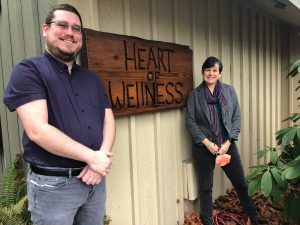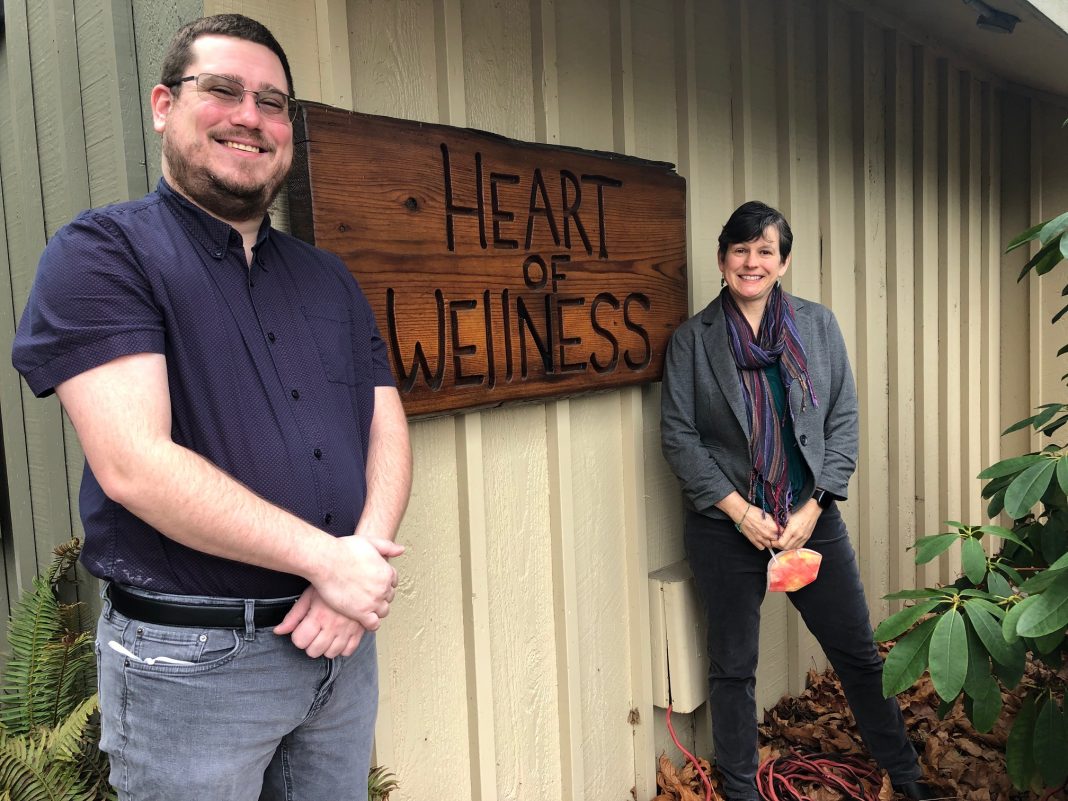You may have heard of prebiotics and probiotics, but have you heard of postbiotics yet? If not, and you want to improve your intestinal health, expert advice is right around the corner. Reach out to Laura Woodworth at Heart of Wellness in Tumwater.

“There is so much research coming out on the gut microbiome,” Woodworth says. “It’s really exciting.”
Woodworth is a registered dietitian nutritionist with a Master of Science in nutrition from Bastyr University. This is her second year at the Heart of Wellness clinic, an integrative health practice providing primary care, acupuncture, Asian medicine, physical therapy, myofascial release and nutrition counseling.
Woodworth says recent research is increasingly looking at the role of gut health in our overall well-being, particularly conducting close study of the microbiome in the last few years. The gut microbiome contains microorganisms including bacteria that have a beneficial role not just in processing food, but also in sending information to our nervous system. “In the process of fermentation, the bacteria release metabolites that influence our health,” Woodworth says. “They can be anti-inflammatory and calming. They signal our intestinal cells to stay tightly closed and decrease inflammation.”
“The research is coalescing,” she adds. “They are starting to see patterns.”
The Three Ps—prebiotics, probiotics and postbiotics—are keys to this process. Woodworth says prebiotics are dietary fibers that nourish the good bacteria in your gut, which are the probiotics. “Prebiotics are basically feeding your microbiome,” she says. “You eat them, and they are not digested. They go down into your large intestine and feed your microbiome.” Prebiotics are in foods like sweet potatoes, bananas, garlic, onions, oats, apples and leeks.

Probiotics are microorganisms that function as beneficial bacteria in the gut. They are in fermented foods like sauerkraut and chilled pickles, as well as yogurt, cottage cheese and other foods. Woodworth says you can also get probiotics in pill form. Probiotics have been shown to support gut health and the immune system.
The latest addition to this discussion is postbiotics. “This is a new term,” Woodworth says. “We will start to see it more and more. It refers to the products produced from the bacteria.” Researchers are examining the role of short-chain fatty acids released in the last stages of the digestive process because they are finding these bacteria-produced metabolites throughout the body, including in the bloodstream and organs.
Harvard Health Publishing at the Harvard Medical School in a recent article “What are Probiotics?” describes that, “Focusing on getting enough of the foods that promote a mix of healthy gut bacteria may help improve your overall health.” Woodworth says the digestive system has as many nerves as the spinal column, so it may be sending just as many signals through the nervous system when processing food, including delivering signals to reduce inflammation.
So how do you get more of prebiotics, probiotics and postbiotics? One way is to consult a nutritionist like Woodworth. She works with patients to find ways to improve their specific diets and address intestinal health issues.

Woodworth says when seeing new patients, she listens to their concerns and collects data including information on their laboratory test results, gastro-intestinal symptoms, body mass index, energy level, sleep, exercise, stressors, food, supplements and medicines. An initial intake averages about an hour and 15 minutes. “Sometimes I come up with an early plan or recommendation,” she says. “And then I will see them in a couple of weeks, and for a third or fourth appointment. Behavior change is not easy, and they may need some help with accountability.”
Woodworth says new patients often know their intestinal problem may not have a quick answer, but on occasion there is one. “Sometimes it’s easy to fix, for example, not having a Coca-Cola at lunchtime,” she says. Woodworth walks the path with her patients to design a food plan that considers the patient’s real life eating habits, which can be a fun but sometimes complex process. “We are trying to find a balance so that the behavior changes we decide on will have the most ‘bang for the buck’” she says. Woodworth also works with the Heart of Wellness team of naturopathic physicians, acupuncturists, physical therapists, and a massage therapist to address a patient’s particular needs.

Meanwhile, Woodworth’s top three suggestions to improve intestinal health are to eat a wide variety of colorful, whole (unprocessed) foods, avoid added sugar, and drink plenty of water. She says to think of processed food as “predigested” which robs the intestinal system of the critical steps in breaking down foods and releasing important signals to the body. “We have feet and feet of intestine,” she says. “But if the food is ‘predigested’ we are absorbing it so early that we end up robbing the microbiome of its food source and weakening it.”
Along with other members of the Heart of Wellness team, Woodworth offers her skilled insight at free webinars and public talks to cover topics such as intestinal health tips. Upcoming webinars can be signed up at the Heart of Wellness website. Past webinars can be viewed there as well. Information about Woodworth’s practice and Heart of Wellness is on the facility’s website and Facebook page.
Heart of Wellness
205 Clark Place SE, Tumwater
360.570.0401
Sponsored




















































